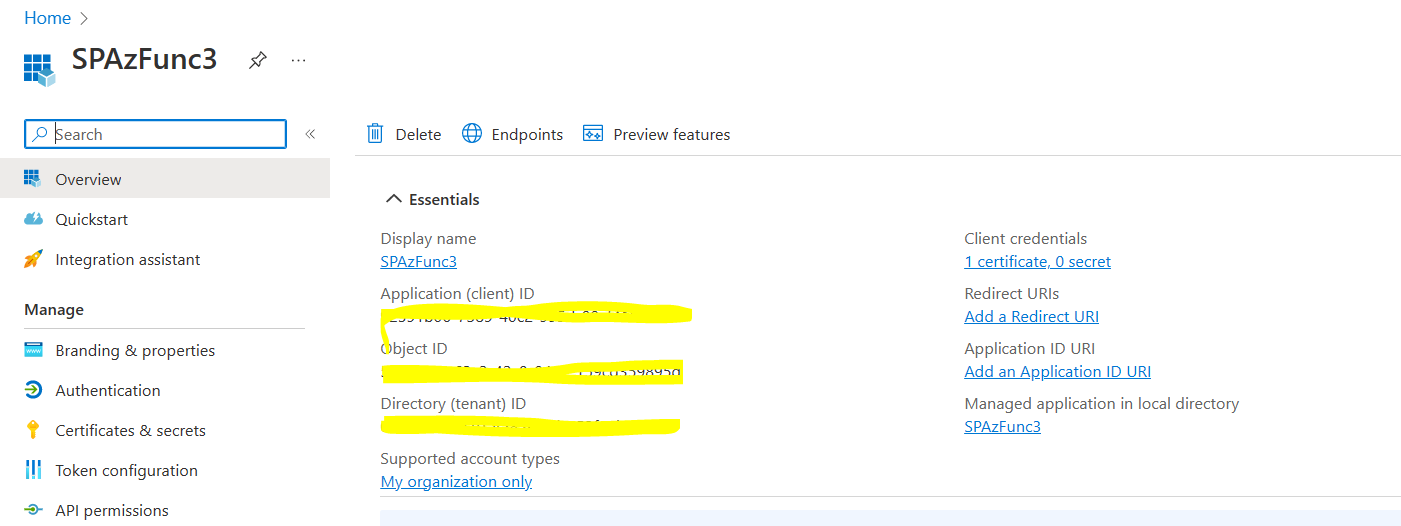I created my first Azure Function which integrate with SharePoint Online list, using those main points:-
- I created an Azure App with self-sign certificate to authorize my Azure function.

- I created a new Azure Function project using Visual Studio 2019. here are the main components
Function.cs:-
using System;
using Microsoft.Azure.WebJobs;
using Microsoft.Azure.WebJobs.Host;
using Microsoft.Extensions.Logging;
using PnP.Core.Services;
using PnP.Core.Model.SharePoint;
using System.Collections.Generic;
namespace FunctionApp1
{
public class Function1
{
private readonly IPnPContextFactory pnpContextFactory;
public Function1(IPnPContextFactory pnpContextFactory)
{
this.pnpContextFactory = pnpContextFactory;
}
[FunctionName("Function1")]
public void Run([TimerTrigger("0 */5 * * * *")]TimerInfo myTimer, ILogger log)
{
log.LogInformation($"C# Timer trigger function executed at: {DateTime.Now}");
using (var context = pnpContextFactory.Create("Default"))
{
var myList = context.Web.Lists.GetByTitle("SubFolders");
Dictionary<string, object> values = new Dictionary<string, object>
{
{ "Title", System.DateTime.Now }
};
// Use the AddBatch method to add the request to the current batch
myList.Items.AddBatch(values);
context.Execute();
}
}
}
}
Startup.cs:
using Microsoft.Azure.Functions.Extensions.DependencyInjection;
using Microsoft.Extensions.Configuration;
using Microsoft.Extensions.DependencyInjection;
using PnP.Core.Auth;
using System.Security.Cryptography.X509Certificates;
[assembly: FunctionsStartup(typeof(FunctionApp1.Startup))]
namespace FunctionApp1
{
class Startup :FunctionsStartup
{
public override void Configure(IFunctionsHostBuilder builder)
{
var config = builder.GetContext().Configuration;
var azureFunctionSettings = new AzureFunctionSettings();
config.Bind(azureFunctionSettings);
builder.Services.AddPnPCore(options =>
{
options.DisableTelemetry = true;
var authProvider = new X509CertificateAuthenticationProvider(azureFunctionSettings.ClientId,
azureFunctionSettings.TenantId,
StoreName.My,
StoreLocation.CurrentUser,
azureFunctionSettings.CertificateThumbprint);
options.DefaultAuthenticationProvider = authProvider;
options.Sites.Add("Default", new PnP.Core.Services.Builder.Configuration.PnPCoreSiteOptions
{
SiteUrl = azureFunctionSettings.SiteUrl,
AuthenticationProvider = authProvider
});
});
}
}
}
local.setting.json:
{
"IsEncrypted": false,
"Values": {
"AzureWebJobsStorage": "UseDevelopmentStorage=true",
"FUNCTIONS_WORKER_RUNTIME": "dotnet",
"SiteUrl": "https://***.sharepoint.com/",
"TenantId": "0b***",
"ClientId": "92***",
"CertificateThumbPrint": "EB***",
"WEBSITE_LOAD_CERTIFICATES": "EB***"
}
}
then i deploy it to Azure and it is working well, where each 5 minutes it adds a new list item. but i have those questions:-
- Am i am doing things correctly, especially from a security perspective? as at the end my Azure function will have a public URL as follow
https://functionapp1*****.azurewebsites.net and this can be called by any anonymous user.. so is this a security hole? if so, then how i can fix it?
- I am currently using self-Signed certificate, so is it fine for Production? if not, then what i need to do , to get a proper SSL ?
Thanks